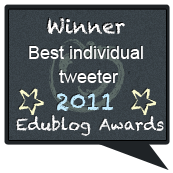Back in my first year, I was teaching a unit on the parts of the Periodic Table. The students needed to know where they could identify elements that were typically metals, non-metals, gases and be able to identify elements based on their Atomic number among other tasks. At the time, I believed I was doing exactly what my standards said I had to. My students needed to know the organizational structure of the Periodic Table and by golly they were gonna know.
So for a week, I stood in the front of the room while students furiously wrote down every word that came out of my mouth. Atomic number, Lanthanide Series, electrons. I could see at the end of each day confusion on their face but I chalked that up to their needing to go home and review their notes so they would "get it." No need for me to change what I was doing. They needed to catch up.
At the end of the week was the big assessment. I was pretty proud of myself. I had imparted all sorts of Periodic Table knowledge on my students and now we were going to see them shine with it came time to recall all that information. That weekend I got the biggest wakeup call of my, then brief, educational career. Most could not recall a single thing. Some got an answer here or there but for the most part, there were no bright spots from this assessment.
After the anger at my students subsided, I looked inward. What could I have done differently? There had to be a better way than letting my students get all the way to the end of a unit of study to have them not know anything.
Formative assessments changed my classroom.
That look of confusion on my students faces was a clear sign I needed to step back and look at what I was doing and how I was teaching. Had I used some kind of formative assessment I wouldn't have needed the summative at end, nor would my students have gotten to the point of utter confusion.
Formative assessments are simply little gauges or indicators of how students are progressing towards a learning goal. It could be anything from a simple conversation to something like a clickers or response via a website. It is the formative assessments throughout learning that give us the indication we are headed down the right path with our learning or whether we should take a right turn to get back on track. The use of the formative assessments help teachers understand where their students are and, more importantly, where their teaching is. Had I used formative assessments, I would not have had to take another week breaking things down with the Periodic Table. I could made my adjustments along the way.
How can you use formative assessments today? Simple!
1) Ticket out the door-One of the first things I did was put sticky notes on every student's desk. at the end of class they had a chance to summarize what we did that day and ask any questions they wanted. They could put their name on it or could remain anonymous. Either way I had a good indication of whether my students got it or didn't. And I could make those on-the-fly adjustments for the next class or for the next day. Now we have virtual sticky notes like on Wallwisher and LinoIt that make this process that much easier.
2) Real-Time Feedback- I can make those on-the-fly changes by using a real-time feedback program like UnderstoodIt. By having students simply answer "Understand" or "Confused" at various times of class, you gain that valuable feedback needed to make changes to the learning. You don't have to wait until tomorrow. And you can better understand the learning needs of your students to customize the learning environment to them.
3) Building It In- There are loads of services and sites out there do polling, quizzing or response. Utilizing these can help in the formative assessment process by building in those natural places to stop and reflect on how the learning is going and how it might need to be improved. Again, if I can make those adjustments as I go, I can catch things before they go off the rails.
3) Building It In- There are loads of services and sites out there do polling, quizzing or response. Utilizing these can help in the formative assessment process by building in those natural places to stop and reflect on how the learning is going and how it might need to be improved. Again, if I can make those adjustments as I go, I can catch things before they go off the rails.
Whether you use something at the end of class or during or both, formative assessments can change your understanding of your students and yourself. After our disaster unit on the Periodic Table, I used formative assessments in my classroom everyday and never again did we have a repeat of that week. Over time the students felt comfortable enough to tell me when they really didn't like the learning style I was using or that they enjoyed a particular way I presented the content. I had a better grasp on the learning my students were doing and they had a better grasp on the content. It was a definite win-win.
How have you used formative assessments? Leave some insight below.
photo credit: Benjamin Chun via photopin cc







